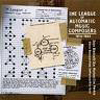 8-Bit artists and circuit benders active in today’s vibrant scene have met their match—and their aesthetic ancestors—in the League of Automatic Music Composers. Regarded as being the worlds first computer band, their unique foray into electronic sound worlds began in tandem with the budding world of microcomputers, which in the mid-1970s were just then newly available on the commercial market.
8-Bit artists and circuit benders active in today’s vibrant scene have met their match—and their aesthetic ancestors—in the League of Automatic Music Composers. Regarded as being the worlds first computer band, their unique foray into electronic sound worlds began in tandem with the budding world of microcomputers, which in the mid-1970s were just then newly available on the commercial market.
This is certainly one of my favorite recent releases from New World. The material was culled from a dusted off shoebox filled with over 30 cassette recordings in the possession of Tim Perkis, and 15 more from other band member Jon Bischoff. This collection comes 30 years after their initial formation, and is their first official release outside the appearance of a single track on a Lovely Little Records comp from 1980. James Horton, David Behrman, Paul Demarinis and Rich Gold were the other members who formed this notable collective. After the groups demise in 1983 when Horton's rheumatoid arthritis became debillitating, they all continued working in artistic, musical and academic fields with much mutual success.
Arising out of the Silicon Valley before it was even known as such, the exuberance heard on these recordings comes in part from the exploration of uncharted territory: no software, plugins, or presets were available for the Kim-1 which they learned to program for themselves in the 6502 machine language. The songs come from their many live performances in concert halls and art spaces around the Bay Area, from those played on the airwaves of freeform radio stalwarts KPFA, and the many sessions improvised at home. Occasionally, behind the oscillating din of singing circuits laughter and exclamations of an audience can be heard. People then weren't accustomed to the sounds of live computer music, which up until that point had been the province of a handful of university studios who committed music to magnetic tape for later playback and where the emphasis was more on precise control of the sound, as opposed to hearing what might happen when a bunch of computers are set up to interact with each other.
Networking their machines together, the League always played live, with nothing sequenced or pre-planned except for the programs each player had written for their station. The transmission of data between devices now linked together and modulating eachother gave the proceedings an element of indeterminacy, yet within the chaos of fluttering chords, degenerate blips and random tones there is an emergent sense of order. Listening to tracks like “Finnish Hall” is like taking a hallucinatory stroll through a basement arcade or visiting an electronic oracle whose voice is tweaked to a point beyond earthly comprehension. “Martian Folk Music” looks forward to a time after the Red planet has been colonized, when dulcimers and fiddles are no longer in the cultural repertoire, and when people square dance to the sounds of artificial intelligence improvising long glissando sweeps over a staccato pulse of gated, interrupted chords. “Oakland Four” consists of mysterious drones that gradually ascends an upward spiral of tone, joined by squeaking sounds, akin to those made by a rubber duck, and a low bass hum that keeps everything grounded. Each piece offers a different window into the various working processes of these hacker musicians who were engaged in a deep experimentation with the technology at hand.
My only complaint about this release comes from my greed: with so many tapes of music as potential source material, and with music this engaging, I wonder why it wasn’t expanded to be at least a double CD. Having been provided with these crucial sounds I want to hear more of what is on those tapes.
samples:
Read More

